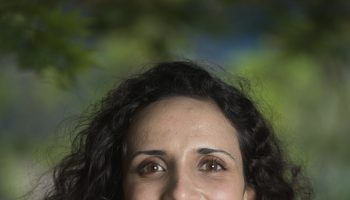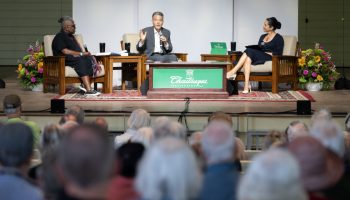
Julia Weber
Staff writer
For PBS News Hour co-anchor Amna Nawaz, quality, trusted, community-focused journalism can foster resiliency and build bridges, changing the lives of individuals who “through their own individual power and through their own individual will and vision and dedication and leadership, managed to change not only their own lives, but the lives of everyone around them.”
Often, Nawaz is reporting on the worst news, so she said an opportunity to share the most inspiring and uplifting stories of her career is a welcomed one.
“One of the reasons I was so excited to come be a part of this week is, so often, my job focuses on the worst things that are happening, and this was an opportunity to do the opposite, which was to highlight all the good things that we see everyday in the terrible news that we often have to cover,” Nawaz said.
ỹ will deliver the morning lecture at 10:45 a.m. today in the Amphitheater. She continues the Week Seven Chautauqua Lecture Series theme of “Kwame Alexander and Friends: The Power of One” by sharing some of the most impactful news stories of resilience, community and positive change she has reported on throughout her career in journalism.
Prior to joining PBS News Hour in 2018, Nawaz was an anchor and correspondent at ABC News. Before that, Nawaz was a foreign correspondent and the Islamabad Bureau Chief at NBC News. Additionally, Nawaz is the founder and former managing editor of NBC’s Asian America platform.
This morning, Nawaz plans to share some of the most powerful moments from her more than 20-year career as a reporter, and the sources behind them.
“I just can’t shake their stories, and I think when people hear about them, they won’t be able to forget them either,” she said.
Nawaz said she often wrestles with how to balance the duty to cover newsworthy events — which aren’t always uplifting stories — with her responsibility to “make people care.” To her, what resonates most with her audiences are stories that they can relate to.
“One of the biggest challenges we have as journalists is to find a way to build bridges between people: the story that we’re covering and the people that we’re communicating to,” Nawaz said.
Recently, the Corporation for Public Broadcasting announced a “wind-down” of its operations after the passage of the Rescissions Act of 2025 and the release of the Senate Appropriations Committee’s 2026 appropriations bill, which excludes funding for the corporation for the first time in more than 50 years. These cuts will affect PBS and NPR, both leaders in U.S. public media, but will have far greater repercussions for the local member affiliate stations of both PBS and NPR.
To Nawaz, these cuts are “devastating to public media as a whole (and) to the institution of journalism as a whole.” She said audiences should be most worried about how these cuts will impact their local member stations, which often rely more heavily on funding from CPB than the national organizations of PBS and NPR do.
“I think people should be worried about that,” she said. “They should be worried about losing their local paper here. They should be worried about the loss of local journalism across this country because that is where the frontline work is done.”
In the wake of the recently-announced budget cuts, however, Nawaz said the outpouring of support has been demonstrative of the nation’s trust in public media.
“If the response we’ve seen from our viewers and from the country as a whole — and the place that we’ve seen public media hold in their trust — mean anything, then I feel very confident saying that we’re not going anywhere,” Nawaz said.
In her reporting, Nawaz said she prioritizes honesty, fairness and accuracy and hopes that the combination of what she witnesses and her extensive career as a reporter “presents the most accurate and credible picture that people can bank on.”
To her, it is important to understand that each reporter — just like the communities they cover — is a culmination of life experiences, and they bring that to the stories they report on.
“It’s a false assumption that journalists show up as blank slates to every story that they cover,” Nawaz said. “We are cumulative human beings who are nothing but a coming together of all of our lived experience just like everyone else, and I think that helps our work. Story No. 10 builds on stories one through nine that we covered, and that is the way it should be.”
Nawaz said while many viewers may come to know her through her onscreen presence delivering daily news to audiences, she hopes people will understand that the news segment doesn’t end after one hour, and the reporting doesn’t end with her. She said, often, the stories being reported are ones that journalists — onscreen and off — have been reporting on “for weeks if not months.”
“I don’t think most people understand the lengths to which our teams go and how hard they work and how dedicated they are to the facts and how much that defines who we are,” she said.
Ahead of her lecture, Nawaz said she believes now is a time for people to take action, however they see fit, to advocate for the causes they care about.
“A lot of people think things are beyond their control or things are happening to them or around them, and this is one of those moments in history where people acting in the smallest of ways in their own communities — to protect their local newspaper, to protect their local member station, to show up and make sure their voice is heard — all of that matters and all of it makes a difference,” she said.




